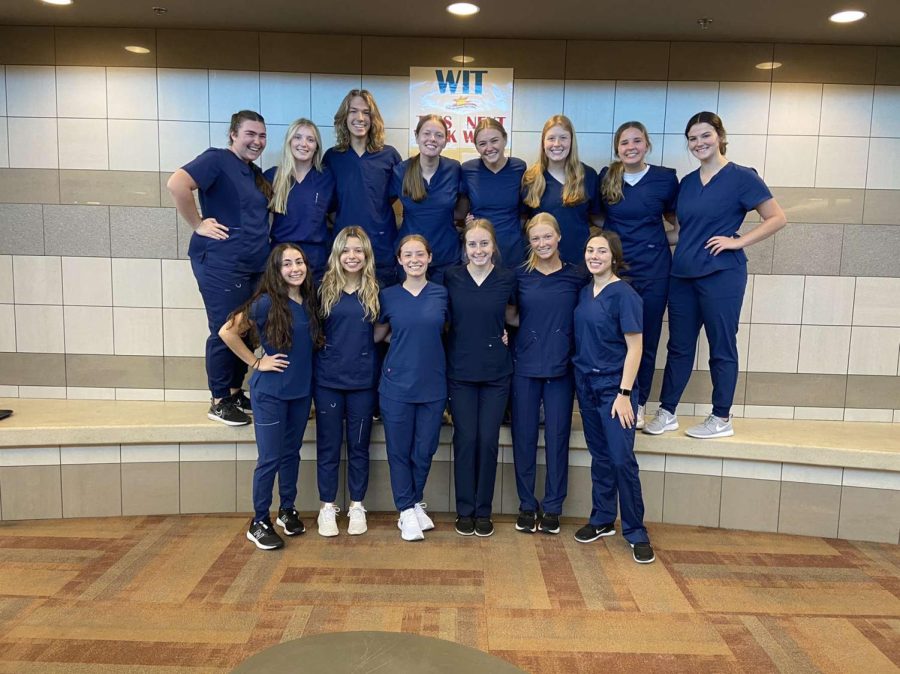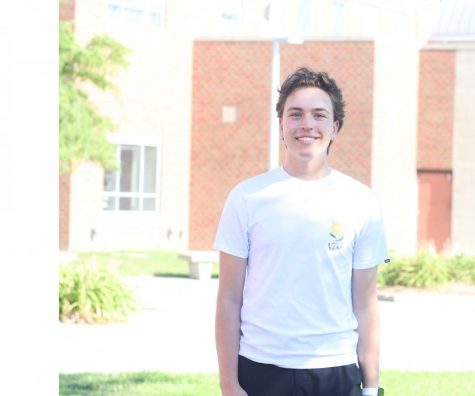Certifying New Abilities
Health Science Academy students put their nursing assistant certification to use
Photo courtesy of Paige Armstrong
Health science academy is getting its nursing assistant certification following the completion of the class within the academy. As CNAs, some are working with patients in assisted living homes which allows them to apply what they’ve learned in class and gain valuable experience. “Health Science Academy has prepared me for the CNA class as well as my EMT class,” senior Paige Armstong said. “There have been a few situations that EMT better prepared me for like when people go unresponsive.”
February 28, 2022
Working a part-time job is common amongst high school students, and what is consistent throughout most of these jobs is the minimum wage. However, for Health Academy students who have taken the required Certified Nursing Assistant (CNA) course and certification, they are looking at potential job opportunities that will utilize what they’ve learned in class while also gaining a higher rate of pay compared to some of their peers.
Students who are in the Health Academy are required to take a CNA course. Following the completion of the course, students are then able to test for a CNA certification. If obtained, students can work as CNAs in assisted living homes which enables them to apply their health science education and gain valuable experience before further pursuing this path post-graduation.
“Becoming a CNA before leaving high school gives students a glimpse into the world of healthcare,” CNA course instructor Torri Merten said. “This provides an opportunity to develop resident rapport and learn how to interact and connect with residents. Students who work as CNAs learn about the different roles of healthcare. They enter a professional role and learn the responsibilities related to that next level of employment. Students learn how to form relationships and work as a team. All of these are important in practice within the health sciences.”
Encouraging their students to apply their knowledge, allows their skills to develop, progressing them closer to their career-oriented goals.
“I got my CNA certification through the Health Science Academy, which is also where I heard about the opportunity,” senior Grace Hoffman said. “I wanted to become a CNA because it will help prepare me for the future I hope to have in healthcare. My time in the Health Science Academy has prepared me so much for this job because of all of the supplemental classes we get to take, like Anatomy and Physiology, Nutrition, Disease Processes and many other courses.”
Another way in which the Health Academy program helps prepare their students for the medical field is by requiring the students to participate in clinicals. These supervised interactions between students and patients at local health facilities, such as Brookstone, give students a feel for what working with patients would be like. For students like senior Paige Armstrong, being in the field surrounded by co-workers who share similar experiences with her makes the balance between school, work and her personal life manageable.
“While we were at clinicals, one of the administrators came in to talk to us about job opportunities, and I loved my clinicals there, so I thought it would be a good fit,” Armstrong said. “Being a CNA has given me more exposure to the medical field, and wanting to be a doctor in the future you need as much exposure as you possibly can get. I have also met amazing people working at Brookstone that have been in the same position as a high schooler, so they help you to balance working there while still maintaining a life.”
Setting students up with places of employment that apply their skills and feed into their future ambitions is a celebrated idea by those who have had years of experience in the field. The merit of giving students a head start on their futures is apparent for many because the opportunity helps further their students’ passion and expertise.
“I have a wide variety of experiences from opening new hospitals, to education, to clinical work,” Merton said. “I feel that you are limited in what you can teach in a classroom. In healthcare, things can change day to day, hour to hour, especially with the recent pandemic. When students get to interact with and care for residents in the clinical portion of the CNA course they learn how to communicate, care for and respect residents. This is so important for being an empathetic care provider. The more experiences we can provide for them in the real world, the more they will be able to apply their classroom knowledge and grow their skills and confidence. Every day opens the students’ eyes to new opportunities and things to learn. If we can provide additional opportunities outside of the day-to-day CNA experience we can further grow their knowledge and passion.”
As these students advance in their education and the world of medicine, their experiences as CNAs will come into play when faced with new challenges. Having experience within the field gives them advantages over their peers when it comes to knowledge and experience.







